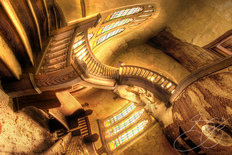
I’m sure we’ve all experienced strange thoughts and sensations between sleep and wakefulness, but mine aren’t usually this bizarre. For many of us the hypnagogic state is especially creative, when the best ideas are forthcoming and an impasse in our writing gets miraculously resolved. But how could I use this? I’m not writing magical realism or sanpro ads.
But I had been struggling to find inspiration for a blog post to accompany the publication of my new story, Winnie the Pooh’s Danse Macabre. I wanted – want – to write about writing about hallucinatory states of mind. In that context, Maeve was a gift.
I’ve been unable to source many examples of fiction featuring hallucinatory states that isn’t jettisoned by treatises on illicit drug use or psychiatric
assumptions about psychosis. I’ve read a couple of good thrillers where it turns out that the jeopardy is all in the protagonist’s head, but to name them here would involve committing the sin of spoiling. There’s the shellshocked war veteran hallucinating birds singing in Greek in Mrs Dalloway, but I’m not so taken with stream of consciousness and multiple exclamation marks.
Once the nurses shuffle out with their instruments of torture, there’s a moment of calm before the ghouls and vampires wake up. Winnie the Pooh materialises first. She stands guard at the foot of the bed, one hand jiggling my temperature chart and the other beckoning to the troupe. The spirits shimmy out from under the bed, contorting their gruesome bodies in a parody of dance.
pseudonymous Maeve but, for me, there’s a much stronger sense here of a story unfolding.
I can’t pinpoint any examples – and perhaps I wouldn’t want to – but I have a sense of some writing about alternate states of mind being dreadfully self-conscious. I wonder if this stems from a fear of getting it wrong.
Should it be scary to write a character whose reality is distorted? I think the same rule applies as with writing dialogue: it doesn’t have to be accurate (how tedious to read all those umms and ahs of normal speech) but it does have to seem so, and how we achieve such artifice is difficult to pin down. It’s not dissimilar to writing from a child’s point of view: an effective voice is more important than an accurate one – although given that as yet there’s no standardised version of a small human being, who’s to say what’s
accurate?

Do let me know what you think.
And how about ballooning over to Far Off Places for more written whimsy?





















 RSS Feed
RSS Feed





















